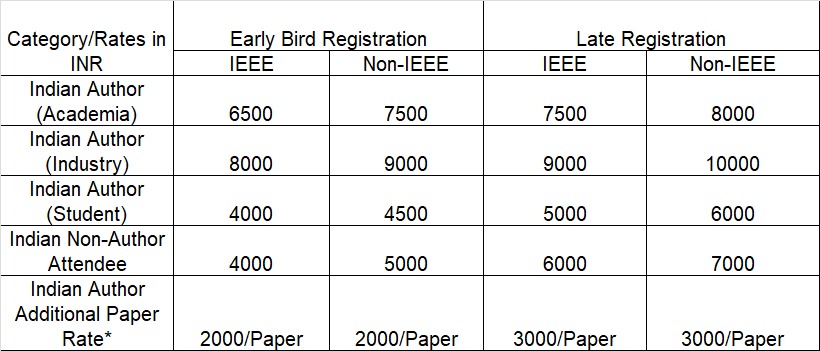Registration

* The final PDF for each accepted paper may contain up to six pages. The final version of the paper may include up to two additional pages in addition to the required six pages, if necessary. A fee of INR 2000 per extra page must be paid at the time of author registration payment in order to accomplish this.
FOR AUTHORS
At least one of the authors of every accepted paper must register for the conference as author and present the paper in order for it to be included in the conference proceedings of RASEFT2024, and subsequent inclusion in IEEE Xplore® digital library.
If more than one author of an accepted paper wishes to attend the conference, all such authors need to be registered separately by paying applicable registration fee.
Additional authors (other than those who are included in the manuscript submitted for review) cannot be added to the camera-ready paper.
Non-refundable registration fee must be paid prior to uploading the final IEEE formatted, Camera-ready version of the paper and e-copyright form.
Refund Policy
All registration fees covering a paper are non-refundable. For registration fees not covering a paper, a full refund, after Rs 1000 processing fee, will be given, provided the request is applied for prior to the last day of the Registration Last date.
Author Registration: Each accepted paper must be covered by at least one non-student registration and one non-student registration can cover up to two papers.
Non-Presented Paper (No-Show) Policy: Any accepted paper included in the final program is expected to have at least one author to attend and present the paper in person/virtual at the conference. If a paper is not presented at the conference, the paper will not be sent to IEEE on IEEEXplore. For poster sessions, if the speaker is not present in front of the poster for most of the time during the poster session, this also implies the paper was not presented.
Transfer Policy
All requests for registration transfers must be provided in writing and email, 30th November 2024. Registration rate difference will apply depending on the membership status of the new registration.
FOR ALL CONFERECNE
ATTENDEES
All participants
need to be registered to attend the RASEFT2024 by paying the requisite
registration fees.
Ø
The registration fees include the conference
kit, access/admission to tutorials & technical sessions, lunch on all
conference days, morning and evening refreshments, banquet dinner,
access/admission to cultural events as part of the conference.
Ø
Please note that the fees shown above are
inclusive of all taxes and levies. Any gateway charges along with applicable
taxes or levies, if any, will have to be borne by the registrant.
Ø
IEEE members are requested to upload IEEE
membership details during the online registration process, if registering under
IEEE category.
Ø
Students are requested to upload valid student
ID card (front and back side) during the online registration process, if
registering under that student category.
Ø
Please keep a copy of the transaction ID,
generated by the payment gateway as well as by your bank. You may need these
later if you need to track your payment/registration.
Ø
All correspondence regarding registration for
RASEFT2024should contain Paper ID as well as registration confirmation number.
Ø
Please note that RASEFT-2024, or the organizing
institute Maturi Venkata Subba Rao(MVSR) Engineering College, will not be responsible for any
loss, financial or otherwise, caused by improper transactions conducted online.
While organizers have taken all reasonable precautions to ensure a safe online
transaction, it is the registrant’s responsibility, while paying the
registration fee, to secure their user IDs, passwords, Paper ID, etc.
Ø
Student authors those who wish to apply for
fellowship may do it separately and the organizing committee will decide on
such cases as per policy norms.
Ø Link for this will be provided after the last date of submission of camera ready version of the paper.